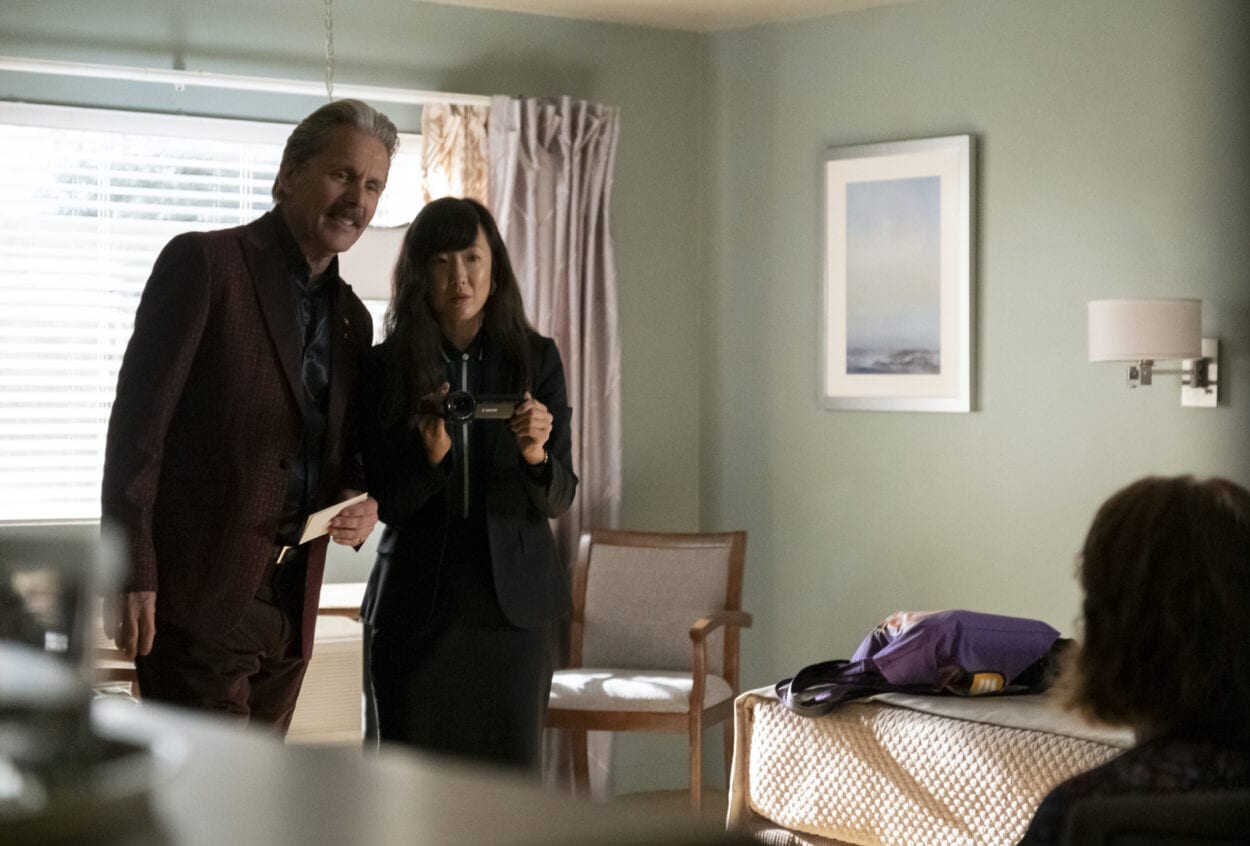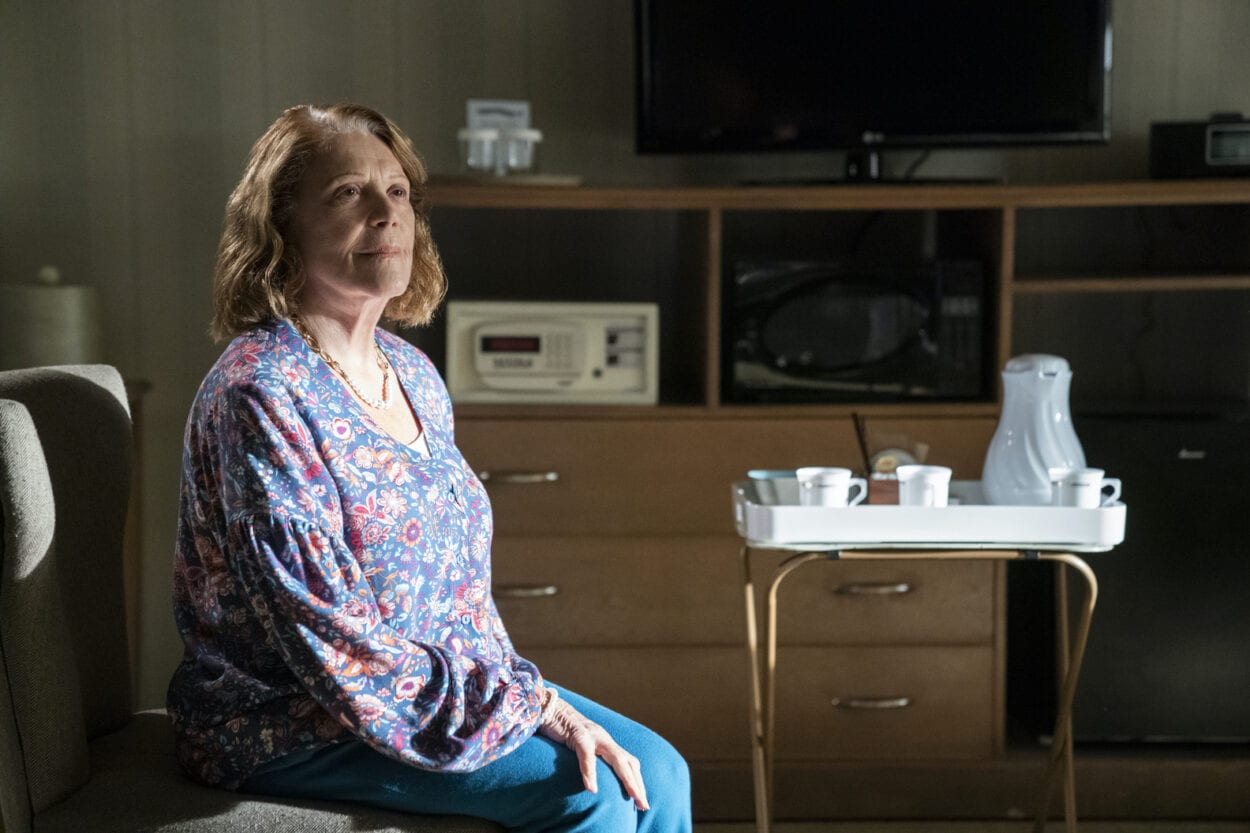Room 104 S4E8 “No Dice” (written by Julian Wass and directed by Patrick Brice) gives us the story of an older woman named Enid (Linda Lavin) who is obsessed with game show host Chip Crawford (Gary Cole). This type of parasocial interaction is not uncommon, even if most of us don’t engage in it to the extreme that Enid seems to (and even she isn’t as far on the spectrum as people who write letters to soap opera characters as though they were real people they know). The game show host in particular is the type of figure who opens up this kind of space for many people, who tune in perhaps every day and start to feel like they know Bob Barker or Pat Sajak. I don’t know about you, but when I learned that Alex Trebek had cancer, it felt at least sort of like learning this about a friend.
In this way “No Dice” presents a perfect set up for the story it wants to tell. Chip is coming to visit Enid, who claims to be his biggest fan, apparently as a part of a plan to help rehabilitate his image. It was the network’s idea, not his, and he clearly wants to get the visit done with as quickly as he can. His producer Steph (Jennifer Kim) is supposed to help with that by saying they need to go to the airport, but he tries to pull the trigger on the magic words too quickly for her to abide. The perfunctory giving of No Dice kitsch isn’t really enough to create a heartwarming video.

Chip treats Steph badly enough that she abandons him in Room 104, saying she will call him a car for later, and Chip in general would seem to be a pretty flawed guy. He has a history of drinking too much, and one has to imagine that the distaste he expresses for his role on No Dice to Enid has seeped at least somewhat into his performance. We may not know exactly what all he has done, but we know he is trying to get back into his audience’s good graces, however reluctantly, and we see that whatever persona he projects on TV, he is a disgruntled man underneath.
He says that he doesn’t care (about his fans, perhaps about people in general…), but Room 104 S4E8 ultimately shows us that this isn’t really true. When he finally agrees to play No Dice with Enid, we can see him slipping into the joy he took in that first episode of the show that she saw, where he lifted the woman into the air. He feeds off Enid’s joy, reprising the style with which he used to say his line because she’d asked him about it earlier, and so on.
Chip resists throughout S4E8 until those final moments. He resists even after Enid tells him her story about how she appeared on No Dice on June 6, 1993, and should have won if it weren’t for him drunkenly putting his hands on the table while he was ogling her breasts, forcing her by rule to roll again due to the interference. He offers to buy her that golden grandfather clock, but that is merely an attempt to make it all go away. And as Enid says, that isn’t the point. The point is the joy she would have gotten from winning the game, and how the clock would have reminded her of the best day of her life every time she looked at it. Instead, it reminds her of the worst.
What is interesting is that Chip does not stop resisting until after the two begin to play No Dice. Even as he sets the game up, his actions stem from anger, or frustration. But then it is as though Enid’s enthusiasm for the game infects him, and he continues to soften as he learns that she knows the details of his career that he turns into trivia questions. She really is his number one fan, and—looking past everything negative—views him with compassion.
And it is compassion that Chip displays when he lies to her about the results of their game of No Dice. I infer that seven and snake eyes are the only possibilities in the game from what is said over the course of Room 104 S4E8. Regardless, Chip changes the losing result to a winning roll of seven before he shows the second die to Enid. Clearly he didn’t want her to be let down.
But was this the right thing to do? I would guess most viewers of “No Dice” to come away thinking that it was, because the consequence was to give Enid a moment of joy and Chip the opportunity to share in that by swinging her around. This might feel like he has made things right, insofar as that was possible.
On the other hand, this is built on a lie. Enid actually rolled snake eyes, and she says herself earlier in S4E8 that what she loves about No Dice is that the result is up to chance—just like life. This worldview is even probably involved in her ability to look past Chip’s interference when she was on the show, and to forgive him.

But when Chip changes the result of the game in Room 104, this is not chance, or the result of absent-mindedness; it is a fully intentional act. And while most of us probably think that lying in an instance like this in order to achieve better consequences is the right thing to do, others like Immanuel Kant suggest that lying is wrong in an unconditional way.
The most important thing may be whether I can trust you. Are we living in the truth? Is our relationship built on that kind of faith, or on some kind of illusion? We might not take No Dice seriously, and it is clear that Chip doesn’t either, but it would seem that Enid does. I would suggest that if she were to find out how Chip altered the result, she would be hurt more deeply by this than by anything he did before that. And if that’s right, how confident can we remain in our judgment that fooling her was the right thing to do…so long as she never learns the truth?
This would seem to be Kant’s main worry, that when you start thinking about morality in terms of consequences, you risk it slipping through your fingers. If I think that some circumstances justify lying, then how might I start rationalizing about others? And can I be confident that the consequences I intend will be those that play out in reality?
We might be confident here that Enid will never learn what Chip did with the dice at the end of their day together in Room 104, but Chip takes a wager in the moment between when he finds the second die and when he shows it to her. He bets that she hasn’t seen it already, which is probably right given her angle on it. But there is some risk here, nonetheless.
I am not arguing that informing Enid that she had unfortunately rolled snake eyes would have been the right thing for Chip to do at the end of S4E8. I don’t know for sure how she might have reacted, but this would have felt like a cold ending to the episode. And yet, everything in Enid’s behavior in Room 104 S4E8 points towards her wanting to have an experience with Chip that is genuine, and to reach a result in their game of No Dice that is the same, as opposed to the game she played on TV where the truth revealed by chance got disrupted.
From this point of view, Chip’s actions are an ultimate betrayal of Enid’s desire that he make things right. He might think that he has by making her happy, but if she values truth above happiness; if it’s not about the prize but the purity of the game and the authenticity of their connection with one another, well, then…no dice.

